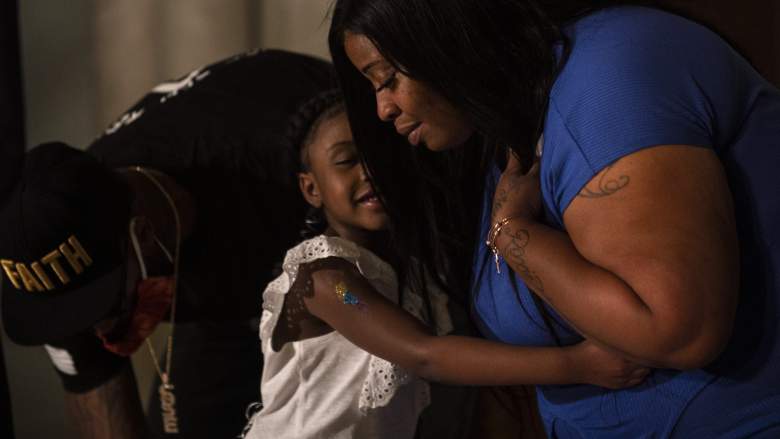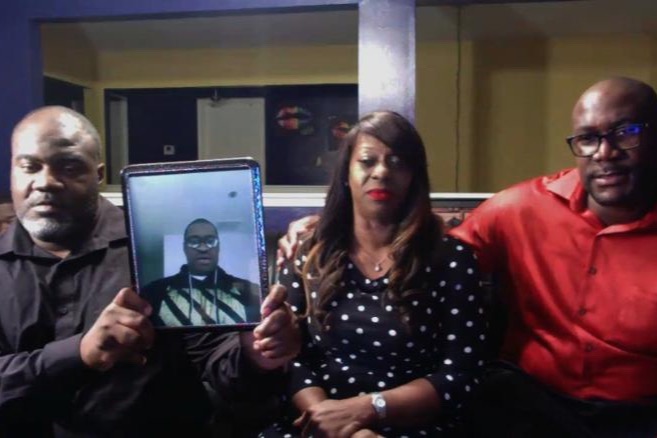
Getty George Floyd's daughter, Gianna Floyd, and her mother, Roxie Washington.
A family memorial is being held today ahead of George Floyd’s funeral.
Former police officer Derek Chauvin was videoed with his knee on Floyd’s neck while Floyd struggled for breath, in footage which has resonated with people around the world. Floyd died while in police custody. You can view the original video here.
Chauvin was charged with second-degree murder. Tou Thao, J. Alexander Kueng and Thomas Lane, the other officers at the scene, are now charged with aiding and abetting second-degree murder, and with aiding and abetting second-degree murder manslaughter with culpable negligence.
Former five-division world boxing champion Floyd Mayweather has donated $130,000 to pay for funeral costs.
The funeral will be held on June 9, with a memorial service being held in Minneapolis today.
Here’s what you need to know about George Floyd’s family:
1. Floyd’s Daughter and Her Mother Have Spoken Publicly About His Death For the First Time
Floyd’s former partner, Roxie Washington, and his six-year-old daughter, Gianna, held a press conference to speak to the media about how his death has affected them.
“I miss him,” Gianna said.
Washington spoke to Good Morning America of her shock and disbelief in learning of Floyd’s death for the first time by seeing it on the internet, and described explaining the death to her six-year-old.
“I wish I could have been there to help him,” she said.
Washington went on to say she “wanted the world to know the George Floyd that they knew, the man who spoiled his daughter and moved here to Minnesota so he could better provide for his daughter.”
Floyd’s daughter is “proof he was a good man,” Washington told reporters.
“He loved his little girl,” Washington said.
Floyd is survived by three children – one son and two daughters. He has a 22-year-old daughter from a previous relationship. She has yet to address the media regarding her father’s death.
2. Floyd’s Family Lawyer has Addressed Reports on Drugs in Floyd’s System, Says the Reports are “a Red Herring”
It has emerged that the man who has been accused of murder and manslaughter charges after kneeling on Floyd’s neck, Derek Chauvin, had 17 previous complaints against him.
Before criminal charges against all four offices involved in the incident were laid, the family’s attorney Ben Crump called for all four officers to be charged.
Minneapolis Police Union Chief Bob Kroll has claimed the men were “terminated without due process,” and has drawn attention to Floyd’s “criminal history,” according to the New York Post:
The union chief vowed that his organization would help the cop accused of killing Floyd, now-fired Officer Derek Chauvin, and three other officers who were at the scene and are being investigated.
“I’ve worked with the four defense attorneys that are representing each of our four terminated individuals under criminal investigation, in addition with our labor attorneys to fight for their jobs. They were terminated without due process,” Kroll wrote.
An independent autopsy carried out by Floyd’s family found he died by homicide caused by asphyxiation, differing in its findings from the official Hennepin County autopsy report, which said Floyd’s death was caused by cardiac arrest, and “potential intoxicants.”
According to Global News, “The medical examiner also listed fentanyl intoxication and recent methamphetamine use, but not as the cause of death.”
The family’s attorney called the connection between drug use and Floyd’s death a “red herring.”
“It is an attempt to assassinate his character, after they assassinated him right then on the video,” he said.
Myth-busting website Snopes has written about the autopsy and the importance of debunking false information circulating about Floyd on the internet.
Floyd’s death could be the catalyst for lynching law reforms in the U.S., as changes that have been 65 years in the making could finally be affected, ABC reported today.
3. Floyd’s Family Started a Fundraiser Which has Raised Over $12 Million to Date

GoFundMeGeorge Floyd’s family.
Instigated by Floyd’s brother, Philonise, the money from the George Floyd Memorial Fund will cover expenses for “mental and grief counselling, lodging and travel for all court proceedings, and to assist our family in the days to come as we continue to seek justice for George,” as well as the ongoing “benefit and care of his children and their educational fund,” according to the GoFundMe page.
His brother writes:
On May 25, 2020, my life shattered as I learned of the tragic passing of my dear brother, George.
My family and I watched in absolute horror as the now infamous and horrifying video began to spread quickly throughout social media.
What we saw on that tape left us shell shocked; a white Minneapolis police officer kneeling directly on my brother’s neck, obstructing his ability to breathe. As some officers knelt on his neck, other officers participated and watched; no one took any action to save my brother’s life.
Those officers would continue to brutalize my brother until he died.
4. Floyd’s Best Friend Was Former NBA Star Stephen Jackson
Former NBA Star, Stephen Jackson, and Floyd shared an unbreakable bond.
Jackson told the “Today” show that Floyd’s death destroyed him, and that he and his lifelong friend were often called twins, due to their striking resemblance to each other.
Jackson spoke about the moments he learned his friend had died, and hearing Floyd’s daughter screams in the background when he made a phone call to the family.
“She has to see this — the whole world has to see this — and she has to deal with it for the rest of her life,” Jackson said.
Inside Edition showed pictures of Floyd’s six-year-old daughter Gianna “sitting on former NBA player Stephen Jackson’s shoulder, who is also Floyd’s best friend, the six-year-old shares how proud she is of her dad’s legacy. ‘Daddy changed the world.’
5. “We Held On:” Floyd’s Aunt Has Spoken Out About Intergenerational Racism
Floyd’s aunt, Angela Harrelson, spoke with the L.A. Times about instances of racism throughout her family history, from her dreams of becoming a lawyer being halted because she was black, to being refused service at hair salons in Minnesota.
Harrelson shared her memories of her nephew as a family man who moved to Minneapolis to be closer to his relatives, and who worked hard to move ahead in life, becoming a bouncer and a retail clerk.
She spoke about her great-grandfather, who was a slave, and her great-grandmother Larcenia, who had 22 children. Her mother, Laura Stewart Jones, “worked in the tobacco fields for $2.50 a day,” and taught herself to read, write and play piano.
Harrelson, who has nine sisters, studied in Iowa before moving to Minneapolis, where she worked as a nurse and modeled part-time.
She says what happened to her nephew has got people discussing “inequities in education, employment and housing her family has faced.”
One day, a professor called her into his office. She couldn’t become a lawyer, he said, she couldn’t even take law classes. He wouldn’t teach her because she was black. Harrelson decided to study psychology instead, then become a registered nurse and Air Force Reserve officer. Officials told her she couldn’t. She ignored them.
Her great-grandfather, Hillary Thomas Stewart, was a slave. He got his freedom at age 8, and settled near Goldsboro, N.C. By age 21, Stewart had accumulated 500 acres of land and married a woman named Larcenia, who would bear him 22 children.
Soon after settling in Eagan, an inner suburb where racism was often hidden in “Minnesota nice,” Harrelson went to get her hair done at the J.C. Penney salon in a local mall. She saw they had products to wash and condition black hair, but their sole black stylist was off, and the white stylist refused.
Harrelson sat down in the salon chair.
“I was like Rosa Parks,” she said, laughing. “I said, ‘I’m not getting out of this chair. I’m not trying to make a statement, I just don’t want to drive to north Minneapolis.’
Speaking about the moments before Floyd’s death, she said:
“He could only fight with his words. He was fighting for his life with his words, and nobody would listen.”
READ NEXT: George Floyd’s 911 Call